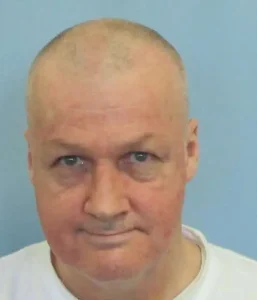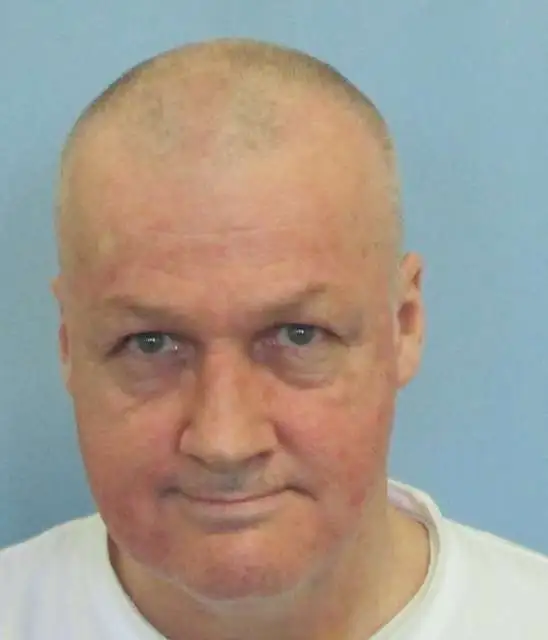Dennis Hicks was sentenced to death by the State of Alabama for the murder of Joshua Duncan
According to court documents Dennis Hicks was the last person to see Joshua Duncan alive. A month later the body of Joshua Duncan would be found and he had been beheaded and disemboweled. Hicks was back in prison on a parole violation, he had served a lengthy sentence for double murder, when he was arrested for the murder of Duncan
Dennis Hicks would be convicted and sentenced to death
Dennis Hicks Photos

Dennis Hicks FAQ
Where Is Dennis Hicks Now
Dennis Hicks is incarcerated at Holman Prison
Dennis Hicks Case
In keeping with a jury’s recommendation, Circuit Court Judge Charles Graddick sentenced Dennis Hicks to death Monday for murdering and dismembering a man in the presence of children.
Wrapping up a two-hour sentencing hearing for Hicks, Graddick ruled that “there can be only one penalty, and that is the penalty of death.”
The case began in October 2011, when human remains were found at a west Mobile site previously used as a law enforcement shooting range. The body was identified as that of 23-year-old Joshua Duncan, a mentally challenged man who had been missing for a month. According to investigators, Duncan’s body was decapitated and disemboweled.
Hicks, then 53, quickly was identified as a person of interest in the case. According to a police investigator, he had befriended Duncan at church, and was the last person seen with him before his disappearance. At the time, Hicks was on parole after serving 25 years for a double murder in Mississippi. In that case, according to an MPD investigator, Hicks had shot and stabbed two victims, then left their bodies in the trunk of a car.
In November 2011, Hicks was arrested for violating his parole, and eventually was charged with Duncan’s murder. He remained incarcerated through his trial; he was convicted of Duncan’s murder in late January, and the jury recommended the death penalty in early February.
Hicks entered Monday’s hearing with a list of objections and motions, arguing that the trial should be thrown out on several grounds. His hair now gray, and his voice nervous, he attempted to argue that his alibi hadn’t been properly considered, that evidence had been planted and that his attorneys hadn’t effectively represented him. “I just don’t think they did me right,” he said. “I was disinformed and lied to by both my counsel.”
Because Hicks’ objections weren’t always formulated in language the court understood, Graddick repeatedly asked him to stop the narrative and explain exactly what his motion was. In response to one of them, Graddick said, “Let’s see, I’ve never done this. I’m denying the motion for me to correct myself.” He denied all Hicks’ motions, except to stipulate that Hicks’ attorneys, Glynn Davidson and Deborah McGowin, would not represent him on appeal
For his part, Graddick said that Davidson and McGowin had “done an outstanding job for you” and “provided effective assistance,” regardless of the outcome. It was a view shared by Assistant District Attorney Jennifer Wright, who said after the hearing that she was familiar with the defenders and that they were “very strong and ethical lawyers” who had done an excellent job under the circumstances.
Dennis Hicks maintained that he had been helping Duncan learn to live independently by renting him a room, letting him work on odd jobs and teaching him to drive. He never would have harmed “Josh,” he said.
“I’m 100 percent innocent,” said Hicks, describing the murder and his prosecution as “a double tragedy.”
As he approached his ruling, Graddick said investigators had found that three small children had been present in the residence where Duncan was murdered. Two of them had testified to details confirmed in forensic analysis of his body: That Duncan had been stabbed and disemboweled, and that his head and hands had been cut off.
“It was very horrific,” said Wright afterward. “It was horrific we had to put the children on the stand.”
Given the opportunity to speak to the court and Duncan’s family one last time, Hicks remained defiant.
“Had I been on the jury, I would have found myself guilty, because this is so rigged,” he said.
He disdained any half-measures. “Since all y’all think I killed Josh Duncan, please sentence me to death,” he said, adding that he’d rather face true justice in the afterlife. He even asked Graddick to give him the maximum sentence on a theft charge related to the case; the judge declined to oblige, sentencing him to time served.
Speaking to Duncan’s grandmother, Dorothy Duncan, Hicks said, “My Bible tells me to forgive. I forgive. I don’t hate y’all.”
In her own turn to speak, Duncan also referred to the afterworld. “A quick death is too good for you. You deserve to live on death row forever,” she said. “I pray my father gives you the justice you deserve when you are very old.”
Dorothy Duncan and other family members did not speak to media after the hearing. But in her own remarks to the court, she said that she planned to push for a law that would require people with violent crimes on their record to notify neighbors, as sex offenders are required to do.
“My Joshua deserves his rights, that he didn’t get,” she said. “I plan to make a ‘Justice for Joshua’ law. I’m working on it.”
Wright said she anticipated that appeals in the case would last “for years to come.”
https://www.al.com/news/mobile/2016/04/in_grisly_murder_judge_agrees.html








